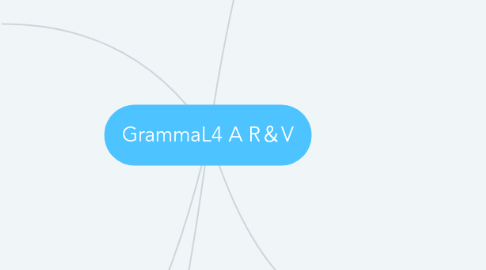
1. Adjectives and Adverbs
1.1. Adjectives and Adverbs Definition: adjective and adverbs are modify and change the words they are described
1.2. Adjective
1.2.1. Example: 1. I am surprised 2. I was amazed 3. I am shocked
1.2.2. Describe noun and pronoun( describe person , place or thing)
1.3. Adverbs
1.3.1. Describe or modify verbs, adjectives, or other adverbs
1.3.2. Example: 1. I finished my job seriously 2. He played happily with his girl friend 3. She went to school sadly
1.3.3. Place an adverb between a verb and its object
1.3.4. Example: 1. I played happily with my parents. 2. I ate quickly with my friends 3. My parents talk seriously with my brother
1.3.5. Auxiliary+ verb, adverbs should take place between two verbs.
1.3.6. Example: 1. my new car was always washed by my mother. 2. my clothes are always been dirtied by my brother
1.4. Why adjectives and adverbs are very useful for us?
2. Roots, Prefixes and Suffixes.
2.1. Roots : Based on "Latin" Borrow from Greek, French, German, Italian and Spanish :
2.2. Prefixes: always use for change meaning
2.3. Prefixes: always use for change meaning of words
2.4. Example: 1. dis-not 2. multi-many 3. inter-between
2.5. Example Additional prefixes: 1. ante-before 2. bi-two 3. co-com
2.6. Suffixes: add to the end of a root
2.7. Example: 1. internation+al 2. profession+al 3. sesion+al
2.8. Why are roots, prefixes and suffixes are very important for us? Because
2.9. Definition: Prefixes and suffixes are sets of letters that are added to the beginning or the end of another word.
3. Active and Passive Voice:
3.1. Active Definition: Denoting a voice of verbs in which the subject is typically the person or thing performing the action and which can take a direct object
3.2. Passive Definition: Denoting a voice of verbs in which the subject undergoes the action of the verb
4. Articles and Preposition
4.1. 1.Articles:
4.1.1. 1. a/an ( +indefinite)
4.1.1.1. Example:1. I ate an apply. 2. I have a pen 3. I wear a skirt today
4.1.2. 2. The ( + definite)
4.1.2.1. Example: 1. The girl doesn't like eating 2. I like the girl 3. she is the beautiful girl
4.1.3. 3. singular nouns sound plural( subjects and verb agree)
4.1.3.1. Example: 1. The boy next door is hungry 2. The news today is very terrible 3. An army needs unity
4.1.4. 4. Intangible or abstract nouns
4.1.4.1. Example: 1. friendship is powerful 2. love is beautiful 3. water is clean
4.1.5. Why articles are useful? Because we use it can reduce grammar errors.
4.1.6. Definition: between objects and other words.
4.2. 2. Preposition
4.2.1. Definition: A word governing, and usually preceding, a noun or pronoun and expressing a relation to another word or element in the clause,
4.2.1.1. Example: 1. she sit on the chair 2. I sleep on the bed 3. He lied on the ground
4.2.2. Preposition phrase: preposition+ object
4.2.2.1. example: 1. I like going to school 2. we play basketball on the playground 3. she want to swim in the swimming pool
4.2.3. Why is preposition useful? Because we need something connect with object and other words
5. Verb Tenses and Irregular Forms:
5.1. 1. Simple tenses: an action or states of being occurs
5.2. 2. Perfect tenses: show the time an action or state of being begins and completed
5.3. Irregular Forms: most verbs in English change to the past need add -ed/-d
5.3.1. Why we use irregular forms? Because have many past tense need to change . we can use irregular forms
5.3.2. Book Page: 264-266.
5.4. Definition Verb Tenses and Irregular Forms:
5.5. 3.Continuous tenses:
5.5.1. Present continue: Definition: start in past, continue in the future
5.5.1.1. Example: I am playing now 2. I am eating now 3. I am drinking now
5.5.2. Past continue: Definition: start in the past and continue after second past
5.5.2.1. Example: 1. I liked play when I was a child 2. I liked eating when I was a boy 3. I played game when he entered in
5.5.3. Future continue: Definition: start in the future and continue in the second future
5.5.3.1. Example: 1. I will leave when you com 2. I will finished my work when teacher come 3. I will turn off my laptop when my father come
5.6. Perfect continue:
5.6.1. Present perfect continue: Definition: start in the past and continue now
5.6.1.1. Example 1. I have been waiting for one day 2. I have eating one bowel 3. she has listening for 2 hours
5.6.2. Past perfect continue: Definition: occurred when second past occurred
5.6.2.1. Example: 1. I have waiting for 2 hours when my father came 2. I have eating one bowel when she came 3. she has listening for 3 hours when i went back
5.6.3. Future perfect continue: Definition: happening when another future happen
5.6.3.1. Example: i will have been swimming for 2 hours by the time you arrive

